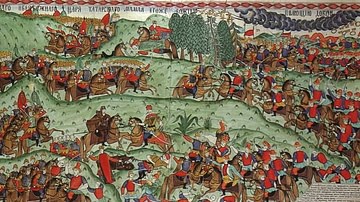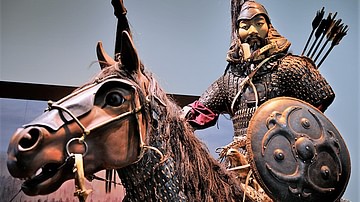Search Definitions
Browse Content (p. 144)

Definition
Yuan Dynasty
The Yuan Dynasty was established by the Mongols and ruled China from 1271 to 1368. Their first emperor was Kublai Khan (r. 1260-1294) who finally defeated the Song Dynasty which had reigned in China since 960. Stability and peace within China...

Definition
The Assassins
The Assassins (aka Nizari Ismailis), were a heretical group of Shiite Muslims who were powerful in Persia and Syria from the 11th century CE until their defeat at the hands of the Mongols in the mid-13th century CE. Secure in their fortified...

Definition
Ancient Argos
Ancient Argos, located in the Peloponnese in Greece, was a major Mycenaean settlement in the Late Bronze Age (1700-1100 BCE) and remained important throughout the Greek, Hellenistic, and Roman periods until its destruction by the Visigoths...

Definition
Galatia
Galatia was a region in north-central Anatolia (modern-day Turkey) settled by the Celtic Gauls c. 278-277 BCE. The name comes from the Greek for "Gaul" which was repeated by Latin writers as Galli. The Celts were offered the region by the...

Definition
Seleucid Empire
The Seleucid Empire (312-63 BCE) was the vast political entity established by Seleucus I Nicator ("Victor" or "Unconquered", l. c. 358-281 BCE, r. 305-281 BCE), one of the generals of Alexander the Great who claimed a part of his empire after...

Definition
Möngke Khan
Mongke Khan was ruler of the Mongol Empire (1206-1368 CE) from 1251 to 1259 CE. As the third Great Khan or 'universal ruler' of the Mongols, Mongke would oversee administrative reforms that continued to centralise government and ensure he...

Definition
Galen
Galen (129-216 CE) was a Greek physician, author, and philosopher, working in Rome, who influenced both medical theory and practice until the middle of the 17th century CE. Owning a large, personal library, he wrote hundreds of medical treatises...

Definition
Golden Horde
The Golden Horde was the European appanage of the Mongol Empire (1206-1368 CE). Begun in earnest by Batu Khan in 1227 CE, the territory that would eventually become the Golden Horde came to encompass parts of Central Asia, much of Russia...

Definition
Mesopotamian Science and Technology
Mesopotamian science and technology developed during the Uruk Period (~4000–3100 BCE) and Early Dynastic Period (~2900–2350/2334 BCE) of the Sumerian culture of southern Mesopotamia. The foundation of future Mesopotamian advances in scientific/technological...

Definition
Mongol Warfare
The Mongols conquered vast swathes of Asia in the 13th and 14th century CE thanks to their fast light cavalry and excellent bowmen, but another significant contribution to their success was the adoption of their enemies' tactics and technology...